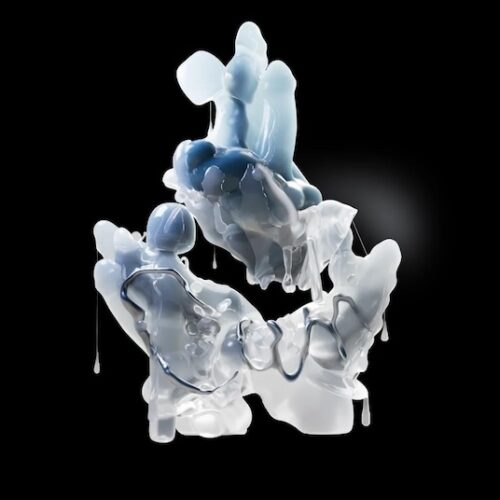“I’ve got no idea what my life will look like in about a year,” Lili Aslo (A.K.A Knife Girl) sang last year on ‘Stop Time’, from her debut album Uniform. Now, she’s swapped indie rock for hyperpop, found a bolder sound, and been through both pain and euphoria.
The Finnish 23-year-old now writes about the joy that came from discovering her gender dysphoria. Since transitioning, she’s enjoying being herself for the first time. She’s less depressed. Her body feels right. She’s finding more pleasure in sex. CUM is a brash and free attempt to bottle those feelings without shame or censorship.
Her early material had an amateurish facelessness to it. CUM is a clear progression, in part because Aslo is more up-front and comfortable. Early single ‘Estrogen’ is a playful and club-ready ode to those miracle hormones. Its bratty looping chorus prods and provokes like a good trans anthem should (“I love my tits / I love my dick / I fill my body up with estrogen”).
It’s a sound she wears well, though admittedly, it’s a hand-me-down, cut from tested formulas from many other acts working in the underground. A decade on from ‘Bipp’ and ‘Vyzee’, the pops and squelches of ‘Satisfyed’ are a tad obvious. Aslo’s songwriting is often rudimental, such as on ‘Fragile’, which doesn’t pop with the passion, longing or lust like you want from a love song. The deadpan dominatrix delivery on ‘Good Boy’ isn’t that shocking or titillating when you’ve been given tinnitus by tracks like it at many a queer club night.
CUM is an album shaped by a community rather than a specific person. The familiar sounds of queer nightlife obscure her, on an album billed as a personal excavation. But it’s only the beginning for Knife Girl. Its most promising moments have specificity, like the opener ‘Share Your Love’, where she unpicks the unexpected jealousy that can arise in a polyamorous relationship. Later, on ‘Knots’, she explores the self-blame that can happen after experiencing hate crimes. There’s an honesty to her panic and frustration.
On ‘Salvation’, Aslo alludes to a suicide attempt before her transition. She wonders if she was given the awareness of her gender dysphoria as a lifeline from a higher power. Then, ‘Beautiful’ imagines the nirvana of passing through to the other side as yourself. This is a vulnerable record for her to release, and it will rightfully resonate. Its themes will be familiar to those who’ve been through it. The album’s route-one approach is forgivable when Aslo is baring her soul. Given her growth as an artist, future Knife Girl projects could well have the songs to match her heartfelt messaging.



